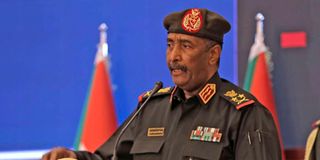Sudan tests El Fasher truce as US sanctions take effect

Sudan's army chief Abdel Fattah al-Burhan, the country's de facto leader since the 2019 ouster of autocrat Omar al-Bashir.
Sudan’s military government leader, Abdel Fattah al-Burhan, has agreed to a one-week humanitarian truce in El Fasher, the capital of North Darfur State, in response to a direct appeal from UN Secretary-General António Guterres.
The call, held on Friday, June 27, 2025, emphasised the urgent need to halt hostilities to allow critical humanitarian aid to reach thousands of civilians trapped by weeks of intense fighting.
This move also coincides with a major international development: the formal implementation of US sanctions against Sudan, a measure that adds new diplomatic and economic pressure on Khartoum amidst a prolonged internal conflict.
During the call, Gen Al-Burhan expressed full support for the ceasefire initiative and reaffirmed the importance of adhering to UN Security Council resolutions, particularly those guaranteeing civilian protection and unrestricted humanitarian access.
El Fasher had become a flashpoint in the wider Darfur conflict between the Sudanese Armed Forces and the paramilitary Rapid Support Forces (RSF).
It had seen severe shortages of food, water, and medical care, with many neighbourhoods cut off due to active hostilities. Humanitarian agencies warned that the situation had reached catastrophic levels.
Medical charity group Doctors Without Borders (MSF) reported its teams had been unable to access certain areas for weeks, raising alarm over disease outbreaks and rising mortality.
The actual implementation of the truce, however, also depends on the commitment of the Rapid Support Forces (RSF), who were expected to respond to the junta’s stance on Saturday.
Guterres also used the call to express support for the appointment of Dr Kamil Idris as Sudan’s new Prime Minister, describing the development as an encouraging signal toward civilian governance and political transition. He pledged the UN’s continued backing for efforts to stabilise the country and promote inclusive governance.
Dr Idris is a prominent international figure, having previously served as Director General of the World Intellectual Property Organization (WIPO). His reputation for integrity and neutrality has raised hopes that the new government—expected to consist of independent national technocrats—can play a stabilising role during the transitional period.
On Saturday, the US officially implemented sanctions against Sudan, invoking the Chemical and Biological Weapons Control and Warfare Elimination Act. The measures follow reports alleging the use of chlorine gas by the Sudanese Armed Forces during operations in Darfur.
The sanctions include:
• Prohibitions on the export of dual-use and defence-related technology.
• Suspension of direct US government support and economic cooperation.
• Financial restrictions on individuals and entities linked to the Sudanese military.
Sudan’s junta may yet struggle with imports, foreign reserves, and inflation. And some local analysts cautioned that the punitive measures may instead entrench isolationist rhetoric, making internal reform and dialogue more difficult.
Darfur’s proximity to Chad and the Central African Republic has given the crisis a regional dimension, however. As fighting intensifies in El Fasher, thousands of civilians have crossed into neighbouring Chad, raising security concerns and stretching limited humanitarian resources. The presence of armed groups operating across borders has further complicated the issue.
Earlier in May, Chad was forced to reject Sudan’s accusations that Chad was shielding some rebels involved in the war. But Chad was already roped into the conflict after thousands of Sudanese refugees sought refuge on its territory.


